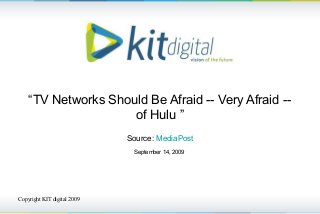Why Networks should be Afraid Of Hulu
•
4 j'aime•462 vues
Hulu is changing TV forever. Not because you can watch it on demand and on a computer but because...
Signaler
Partager
Signaler
Partager

Recommandé
Recommandé
Contenu connexe
En vedette
En vedette (20)
Product Design Trends in 2024 | Teenage Engineerings

Product Design Trends in 2024 | Teenage Engineerings
How Race, Age and Gender Shape Attitudes Towards Mental Health

How Race, Age and Gender Shape Attitudes Towards Mental Health
AI Trends in Creative Operations 2024 by Artwork Flow.pdf

AI Trends in Creative Operations 2024 by Artwork Flow.pdf
Content Methodology: A Best Practices Report (Webinar)

Content Methodology: A Best Practices Report (Webinar)
How to Prepare For a Successful Job Search for 2024

How to Prepare For a Successful Job Search for 2024
Social Media Marketing Trends 2024 // The Global Indie Insights

Social Media Marketing Trends 2024 // The Global Indie Insights
Trends In Paid Search: Navigating The Digital Landscape In 2024

Trends In Paid Search: Navigating The Digital Landscape In 2024
5 Public speaking tips from TED - Visualized summary

5 Public speaking tips from TED - Visualized summary
Google's Just Not That Into You: Understanding Core Updates & Search Intent

Google's Just Not That Into You: Understanding Core Updates & Search Intent
The six step guide to practical project management

The six step guide to practical project management
Beginners Guide to TikTok for Search - Rachel Pearson - We are Tilt __ Bright...

Beginners Guide to TikTok for Search - Rachel Pearson - We are Tilt __ Bright...
Why Networks should be Afraid Of Hulu
- 1. Copyright KIT digital 2009 “TV Networks Should Be Afraid -- Very Afraid -- of Hulu ” Source: MediaPost September 14, 2009
- 2. Afraid of Hulu? • If analyst Laura Martin is right, Hulu is the demon seed that will wipe out the network television business as we know it. In a new report, the Soleil Securities analyst estimates that the online video hub will cost TV networks $920 per viewer in advertising if their audiences are cannibalized by Hulu. And she believes the bulk of viewing on Hulu is indeed taking eyeballs from TV. It's not the first time Martin has sounded the alarm on the rise of online TV. In a May report she warned that the entire $300 billion market valuation of the television industry is threatened by the shift of programming from TV to the Web. Spearheading the overthrow of TV-as-we-know-it is Hulu, the premium video site backed by NBC Universal, News Corp. and Walt Disney Co. that offers content from 120 partners from the Food Network to Paramount Pictures.
- 3. Afraid of Hulu? • As of July, Hulu had grown to 38 million monthly viewers who watched 457 million streamed videos, making it the sixth-most- visited video site, ahead of competitors like AOL, CBS Interactive and the Turner Network, according to comScore. • On the financial side, Martin estimates that in 2009 Hulu will still lose money -- $33 million on revenue of $164 million. NBCU, News Corp. and Disney are believed to keep 75% of estimated revenue, or $123 million. With a rapidly growing audience, high-quality video and increasing revenue, Martin has little doubt Hulu will succeed in the long term.
- 4. Afraid of Hulu? • In its success, however, lie the seeds of value destruction for its TV network creators. Martin's prophecy of doom is built on the assumption that the more content that becomes available on Hulu, the more likely it is that consumers will cut the cable cord altogether. Coupled with that trend is the less attractive economics of online video, which may offer higher CPMs but fewer ads. • "This alternative is much worse than keeping 100% of the ad revenue from the TV," wrote Martin. "Long term, we don't expect the internet audience to ever put up with as many commercials as there are on TV." She adds that the convergence of the PC and TV over the next two years will hasten adoption of the PC as an alternative for watching high-quality programming.
- 5. Afraid of Hulu? • The report assumes the bulk of Hulu viewers use it as time-shifting device to catch up on shows they missed on TV and to avoid commercial interruptions. Hulu CEO Jason Kilar in April told Bloomberg that the site wasn't stealing customers from cable television. • What would be useful is specific research looking at the impact Hulu has had on users' TV-watching habits to inform the debate. While citing comScore figures showing the growing audience for online video (158 million in July), it doesn't take into account Nielsen's most recent Three Screen Report, which showed that people on average watched 141 hours of TV compared to three hours, 11 minutes of Internet video in the second quarter. • How can the networks survive even if the threat from the Web isn't imminent? Martin points to efforts like TV Everywhere, the Time Warner-led initiative that would require people to be cable subscribers to watch TV shows online.
- 6. Afraid of Hulu? • Or they might adopt the approach of CBS, which aggregates all its viewers and sells them to advertisers at the same network CPM of $35, whether it was watched on an actual TV or its TV.com portal. There's also windowing -- holding programs off the Internet until after they aired on broadcast TV or through syndication -- and simply charging an upfront fee as on iTunes. • If nothing else, the report suggests the networks should at least quit airing those popular Hulu commercials starring Alec Baldwin as an incognito alien using Hulu as "an evil plot to destroy the world." • But Martin is not amused: "Moving viewers from the TV to the PC is value- destructive, and adding to the losses of Hulu by spending money on advertising destroys value faster."
- 7. Copyright KIT digital 2009